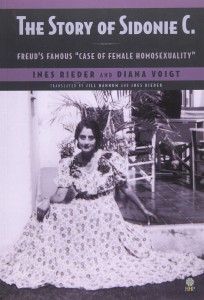The Story of Sidonie C: Freud’s Famous “Case of Female Homosexuality” Ines Rieder & Diana Voigt – Review by Kitty Winslet
The Story of Sidonie C: Freud’s Famous “Case of Female Homosexuality”
By Ines Rieder & Diana Voigt
Review by Kitty Winslet
 ‘Once when I expounded to her a specifically important part of the theory…she replied in an inimitable tone, “oh, how interesting”, as though she were a grande dame being taken over a museum’.
‘Once when I expounded to her a specifically important part of the theory…she replied in an inimitable tone, “oh, how interesting”, as though she were a grande dame being taken over a museum’.
This is the first instance in The Psychogenesis of a Case of Female Homosexuality that the reader is able to pull back the veil of pathology and glimpse at the personality of Sidonie C, Freud’s pseudonymous patient and the subject of Rieder and Voigt’s intimate and richly detailed biography. Comprised of extensive sociohistorical research and oral histories, Sidonie C is the story of a fascinating life that extends far beyond the doctor’s couch.
Born in 1900 Vienna, Sidonie grew up as the daughter of a respectable society family, where propriety was paramount and perceived deviations from strict societal norms were not tolerated. Indeed, it is her infatuation with the seductive Baroness Leonie Von Puttkamer and subsequent suicide attempt that leads Sidonie to be brought to Dr Freud, who diagnoses her with penis envy (despite her protestations that she was ‘unimpressed by it all’) and embarks on an unsuccessful course of treatment to cure her of her ‘inversion’ (‘He was a jerk’, Sidonie remembers, ‘and that’s all there is to it!’).
Throughout the book we are also introduced to the bohemian and often scandalous lives of Sidonie’s social set, which feature affairs with celebrated international actresses, wildly salacious rumours and even one charge of attempted murder. These are lives lived vibrantly against a backdrop of rising national socialism and anti-Semitism, eventually forcing Sidonie, Jewish by birth, to seek refuge with her brothers in Cuba. Following a period of extensive travel, from New York to Bangkok to Rio de Janeiro, Sidonie eventually returns to a Vienna brutalised by the Nazi Regime, and where she will spend her final years until her death aged 99.
In a time of such social and political upheaval, the only real constant in Sidonie’s life is her love of women. Sidonie experiences three great loves in her lifetime which, though deeply and passionately felt, were not always reciprocated with the same vigour. Displaced by war and forced by social convention into an unhappy marriage to a man, she nevertheless held fast to the memories of her beloveds, which ‘survive as a relic in her museum of unrealised love’.
Rieder and Voigt expertly blend historical fact with detailed, immersive prose to paint a vivid picture of life in pre- and post- war Europe. In addition to a fascinating portrait of an individual life, the book also serves as a valuable record of social, cultural, and legal attitudes towards the LGBTQ+ community in C20th Europe. Despite Austria’s criminalisation of lesbianism under §129 I B as an act ‘against nature’, Sidonie C offers insight into a thriving queer scene or ‘demimonde’ operating on the fringes of high Viennese society, and is an essential read for those interested in Queer History and LGBTQ+ studies.
Review by Kitty Winslet
Kitty is an events and cataloguing volunteer at the library for 4+ years. A recent graduate, her interests focus on psychoanalysis, feminist philosophy and queer history.
